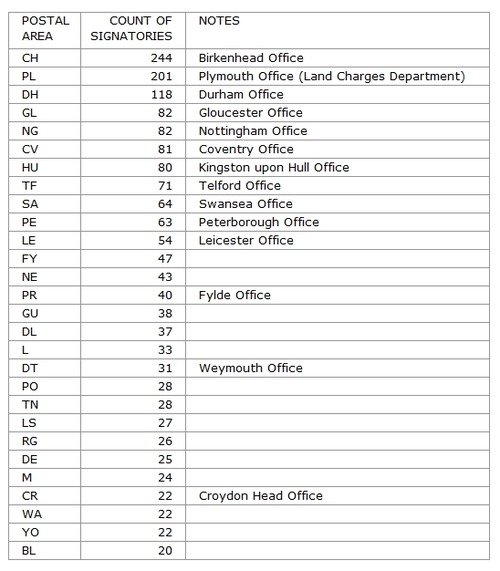
Post: 21 February 2014
As some of you may know the Land Registry for England and Wales have recently been lined up for privatisation. There’s a consultation if you want to give BIS your views on that; the deadline is 20 March 2014.
This move by the Government is an ill omen for the open data community. Land Registry are the first of the four data-rich Public Data Group trading funds to go under the hammer. (The three remaining are Companies House, the Met Office and Ordnance Survey.)

Open data programme under threat
Last year Land Registry demonstrated support for the open data agenda by unlocking their Price Paid dataset of residental sales going back to 1995. This release was particularly significant because it was a rare example of a large public dataset moving from a revenue-generating model to an open licence.
However Land Registry are still sitting on a wealth of data available to the public only on a commercial basis. Of most importance is the database of title registers. At the moment bulk access to that data is prohibitively expensive. This means we have no real idea who owns how much land in England and Wales, or even which areas are private and which are public.
If the Government is not currently pressing Land Registry to release more open data, it is even less likely to do so following privatisation. Even current open data releases such as the Price Paid dataset may not be safe. (We have only to look at the example of British Waterways, which withdrew its open data last year shortly after it was privatised as the Canal & River Trust.)
Although BIS have said a privatised Land Registry will continue to support the Government’s digital by default and transparency programmes, any such assurances are meaningless unless written into legislation.
E-petition
There is a petition against the sale or privatisation of Land Registry on the Government’s e-petitions website. It was created a couple of weeks ago by Elizabeth Matfin, a solicitor based in York, and so far has a couple of thousand signatures. That’s pretty good progress for an issue that has not received much attention in the national media.
The e-petitions site has a little-publicised but useful open data API, which enables us to look at the geographical distribution of people who have signed the petition against privatisation. I’ve pulled out the data for all signatures up to yesterday.
As we can see from the list below, over half of the signatures are from people who live in postal areas where Land Registry offices are located:

What does this tell us? Given the dramatic difference in numbers compared to most other postal areas, it’s a reasonable inference that Land Registry staff themselves are signing the petition. In fact that effect is probably under-stated because some Land Registry staff may not live in the same postal area as their place of work.
Of course Land Registry employ nearly 4,000 people, and many of them may be in favour of the privatisation. The petition only reflects sentiment on one side of the issue.
It’s also possible that the geographical distribution of the signatures reflects general community awareness of the privatisation plans, rather than (or as well as) participation by staff. For example the plans may have been given more local media coverage in communities near to Land Registry offices than they have had in other parts of the country.
What I think these early results do tell us is that the petition has not yet picked up much attention from the open data community, or from the data community more generally. If that were the case I would expect to see London postal areas higher up the list.
Respond to the consultation and/or sign the petition
While experience suggests it would be an uphill battle to dissuade this Government from the course of privatisation, anyone with a strong view on the subject should consider submitting a response to the BIS consultation.
I would also urge anyone who opposes the privatisation plans to sign the petition. I’ll take another look at the geographical distribution of the signatures in a month or so.
Photo credit: HM Land Registry Office, Croydon by Heortlea, CC BY-SA 3.0
For more hijinks with the e-petitions API see my post from April 2013: Maggie Thatcher is unpopular in Liverpool.